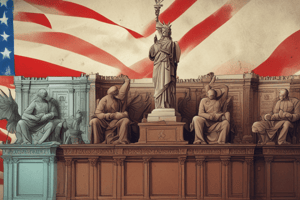Podcast
Questions and Answers
What is the supreme law of the land?
What is the supreme law of the land?
- The Articles of Confederation
- The Declaration of Independence
- The Constitution (correct)
- The Bill of Rights
Which type of federalism is characterized by a clear division of power between the national government and states?
Which type of federalism is characterized by a clear division of power between the national government and states?
- Dual federalism (correct)
- Devolution
- Cooperative federalism
- Fiscal federalism
What is protected by the 5th Amendment?
What is protected by the 5th Amendment?
- Freedom of speech and assembly
- The right to bear arms
- Protection against self-incrimination and double jeopardy (correct)
- The right to a fair trial
What was the main purpose of the Voting Rights Act of 1965?
What was the main purpose of the Voting Rights Act of 1965?
How many members are there in the House of Representatives?
How many members are there in the House of Representatives?
What is the main function of the President's executive privileges?
What is the main function of the President's executive privileges?
What is the highest court in the land?
What is the highest court in the land?
What is the primary function of political parties?
What is the primary function of political parties?
What is the main goal of interest groups?
What is the main goal of interest groups?
What is the process of learning and internalizing political values and attitudes?
What is the process of learning and internalizing political values and attitudes?
Flashcards are hidden until you start studying
Study Notes
Constitutional Foundations
- The Constitution is the supreme law of the land
- Separation of powers: Legislative, Executive, Judicial
- System of checks and balances
- Federalism: Division of power between national government and states
Federalism
- Dual federalism: National government and states have separate spheres of authority
- Cooperative federalism: National government and states share authority
- Fiscal federalism: National government provides funding to states
Civil Liberties
- Bill of Rights: First 10 amendments to the Constitution
- Freedom of speech, press, religion, assembly, and petition (1st Amendment)
- Right to bear arms (2nd Amendment)
- Protection against self-incrimination and double jeopardy (5th Amendment)
Civil Rights
- 13th Amendment: Abolition of slavery
- 14th Amendment: Due process and equal protection
- 15th Amendment: Voting rights for African Americans
- Civil Rights Act of 1964: Prohibits discrimination based on race, color, religion, sex, or national origin
- Voting Rights Act of 1965: Protects voting rights for racial and language minorities
Congress
- Bicameral legislature: House of Representatives and Senate
- House of Representatives:
- 435 members, each representing a district
- Serve 2-year terms
- Senate:
- 100 members, each representing a state
- Serve 6-year terms
- Powers:
- Lawmaking
- Budget and appropriations
- Advice and consent (presidential appointments)
The Presidency
- Executive power: Enforces laws, commander-in-chief
- Executive privileges:
- Executive orders
- Pardons
- Diplomatic appointments
- Presidential roles:
- Head of state
- Head of government
- Commander-in-chief
The Judiciary
- Supreme Court: Highest court in the land
- Jurisdiction: Original and appellate
- Types of cases:
- Original jurisdiction: Cases involving states or ambassadors
- Appellate jurisdiction: Cases appealed from lower courts
- Judicial review: Supreme Court's power to declare laws unconstitutional
Political Parties and Elections
- Functions of political parties:
- Nominate candidates
- Campaign and electioneering
- Governance
- Types of party systems:
- Two-party system
- Multi-party system
- Election types:
- Primary elections
- General elections
- Caucuses and conventions
Interest Groups and the Media
- Interest groups:
- Types: Economic, environmental, social
- Strategies: Lobbying, litigation, grassroots mobilization
- Media:
- Types: Print, broadcast, digital
- Functions: Inform, persuade, entertain
- Relationship between interest groups and media:
- Agenda-setting
- Framing
- Priming
Public Opinion and Political Socialization
- Public opinion:
- Formation: Socialization, media, events
- Measurement: Surveys, polls, focus groups
- Political socialization:
- Agents: Family, school, media
- Processes: Learning, internalization, reinforcement
- Political ideology:
- Liberalism
- Conservatism
- Libertarianism
Studying That Suits You
Use AI to generate personalized quizzes and flashcards to suit your learning preferences.




